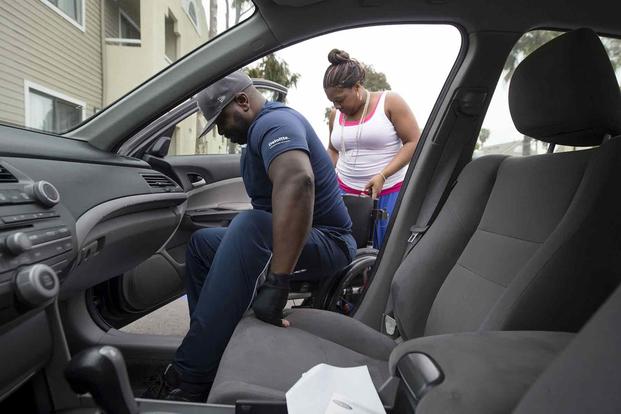Retired Army Chief Warrant Officer Neal Williams has owned several vehicles in the last 25 years that were modified to accommodate his wheelchair and let him drive with hand controls.
For his first vehicle, Williams, who is paralyzed as the result of a combat injury in Vietnam, used a one-time grant from the Department of Veterans Affairs and drove it more than 250,000 miles, until it fell apart.
Williams purchased subsequent vehicles, but he had to pay for them out-of-pocket, shelling out $50,000 for his most recent van, because the VA program allowed for only one purchase across a veteran's lifetime.
Read Next: The Old Air Force Tape Test Is Officially Dead. Long Live the New Tape Test.
New legislation signed Thursday by President Joe Biden changed that requirement. Now, Williams, 73, and other disabled veterans who need modified vehicles to get around, will be eligible for an automobile grant from the VA every 10 years.
Under the Advancing Uniform Transportation Opportunities for Veterans, or AUTO, Act, veterans who have not received a grant in the past 30 years will be eligible for another grant. Thereafter, veterans will be eligible every 10 years.
"I've worn out several vehicles. This legislation allows veterans with mobility issues to be able to get their medical care and go about their normal daily routines that they otherwise wouldn't be able to on their own," Williams said in an interview with Military.com from his home in rural Maine.
Before the legislation was approved, the VA was authorized to pay veterans multiple grants for special adaptive equipment but was limited to a single grant for a vehicle purchase. The VA's program covers a new or used vehicle for veterans with a service-connected disability who need transportation to go to medical appointments and treatment, vocational rehabilitation or certain types of therapy.
In 2022, the grant amount was $22,356. With the average cost to replace a modified vehicle ranging from $20,000 to $80,000 for a new vehicle, and the average lifespan of a van or car at roughly 12 years, the economic impact of transportation needs is significant.
"This bill will help veterans preserve the freedom and independence that adapted vehicles provide them, ensuring they are able to travel safely to and from work, medical appointments, and family obligations," Heather Ansley, associate executive director of government relations at Paralyzed Veterans of America, said in a press statement on Monday.
The legislation was a bipartisan effort by Sen. Susan Collins, R-Maine, and Sen. Joe Manchin, D-W.V. Williams worked with Collins to craft the bill.
"We must continue to honor that commitment to our veterans by supporting their needs, including those of disabled veterans who require adaptive modification of their vehicles long after they are discharged or retire from active duty," Collins said in a press statement.
"Our veterans have made tremendous sacrifices to protect our great nation, and it is our duty to take care of them when they return home," Manchin said in a press release Monday.
The Congressional Budget Office estimated the total cost of the legislation to be $43 million from 2022 to 2032.
The new legislation also includes a provision that allows the VA to pay for vehicle modifications as medical services, such as van lifts, raised doors or roofs, air conditioning or wheelchair tie-downs.
The bill was sponsored in the House by Reps. Dan Meuser, R-Pa., and David Trone, D-Md.
Williams said the legislation will be of tremendous benefit to younger veterans across their lifetimes and those who live in rural areas.
"[Vets in rural areas] have to travel a lot farther for medical care at the VA. The miles really add up," Williams said.
-- Patricia Kime can be reached at Patricia.Kime@Monster.com. Follow her on Twitter @patriciakime.
Related: Severely Disabled Veterans Will Soon Be Eligible for Bigger Adaptive Housing Grants













